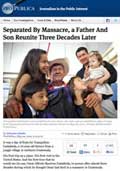ICIJ member Ana Arana talks about the reporting process behind the six-month investigation about a Guatemalan tragedy published by ProPublica, Fundacion MEPI and This American Life.
Finding Oscar is the story of a massacre in the tiny north Guatemalan village of Dos Erres in which more than 250 men, women and children were brutally massacred. Thirty years later a family torn apart by the horrific ordeal were reunited.
I heard about the story in November and we at Fundacion MEPI, a regional project that has been working for the last two years towards developing binational reporting projects, asked ProPublica to join us. They brought in This American Life to the project. We shared reporting duties in the U.S. and Guatemala. As a former U.S. foreign correspondent, I believe stories are more powerful when they include multi-nation groups.
The legal case of Dos Erres was long and convoluted; it took the prosecution 15 years to bring members of the military commando to trial. At the beginning of the investigation, there were a lot of confusing dates and facts.
In the first three months, MEPI, ProPublica and This American Life divided the work by country. MEPI was dedicated to Guatemala and ProPublica and This American Life was involved in reporting in the U.S. Jose Ruben Zamora, publisher of the Guatemalan daily El Periodico, is a long time personal friend and he helped us with contacts and ideas. Zamora’s tough editorial columns have angered dark forces in Guatemala for the last 20 years, but he has paid dearly for his criticism: In 2003 his home was raided by armed men tied to active duty military officers, and his children and wife were tied up and harassed for several hours. In 2008, he was kidnapped and disappeared for a few days, found abandoned with signs of torture in a remote area.
Having worked in previous multi-outlet projects, we knew only one person should write the story. ProPublica was the largest outfit with talented editors and writers, so we agreed that Sebastian Rotella write the English version and we would work out a translated and edited Spanish version.
For me the most poignant interviews were with Don Tranquilino, the father of massacre survivor Oscar Alfredo Ramirez Castañeda who was abducted and raised by a soldier who took part in the massacre. In December when I first interviewed the older man, he could not remember the names of his children, but told me he lost horses and pigs at Dos Erres. In the last interview for the radio program, in March this year, after talking about the horses he segued into an intonation of his children’s names.
Working with different media platforms is difficult. Print reporters can do a lot with one or two interviews, but the long radio format of This American Life was more involved. Some interviews took several hours and were difficult because of the translation.
In the end what worked with this piece was a lot of digging, and amazing writing and editing both in the radio and print versions.
